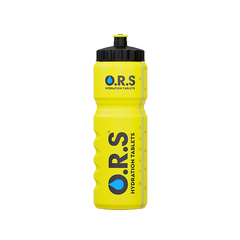Hydration

Whether you’re heading to the gym, working in the garden, or sitting and working at an office job, hydration is something you have to be aware of. Staying hydrated means giving your body what it needs to keep working at its peak, and as you dehydrate you’ll find yourself experiencing more discomfort both physically and mentally. Symptoms of dehydration include aching muscles, mental fog, headaches and of course feeling thirsty. These are an irritant whatever you’re doing, but if you’re in the midst of a tough physical job or a testing workout, the repercussions could be more dangerous than just discomfort.
We’re taking a look into hydration: why it’s important, how to stay hydrated and what else you need to take into consideration when you’re making a hydration plan.
Water is used for dozens of processes throughout your body and every cell in your body needs it to survive, which is why it has such a dramatic effect when your reserves run low. Water is used to protect the delicate tissues of your body that are exposed to the air – your skin uses water to keep up the moisture barrier that prevents irritants and bacteria causing you harm. It keeps your eyes and nasal tissues moist and comfortable and is even used to cushion your brain and spine from shocks and impacts!
Water is also used to give your cells shape and rigidity. Dehydration leeches water out of your cells, and causes them to shrink, which can lead to discomfort and pain in the form of headaches or cramp.
Why is Hydration Important?
Water is used for dozens of processes throughout your body and every cell in your body needs it to survive, which is why it has such a dramatic effect when your reserves run low. Water is used to protect the delicate tissues of your body that are exposed to the air – your skin uses water to keep up the moisture barrier that prevents irritants and bacteria causing you harm. It keeps your eyes and nasal tissues moist and comfortable and is even used to cushion your brain and spine from shocks and impacts!
Water is also used to give your cells shape and rigidity. Dehydration leeches water out of your cells, and causes them to shrink, which can lead to discomfort and pain in the form of headaches or cramp.
Dehydrating
Our bodies dehydrate gradually throughout the day, even if you’re not doing anything particularly strenuous. The normal processes of your body gradually work through your supplies of water: toxins are flushed out of your body with water, sent through the kidneys to the bladder and eventually excreted. Every blink of an eyelid refreshes the moisture in your eyes, keeping them comfortable. You even exhale water when you breathe!
When you start to raise your metabolic rate, whether it’s lifting boxes when you move house, a workout in the gym, or running to make your train to work, all these processes speed up and you lose water in your body faster. On top of that, as your body temperature rises –it starts to sweat. The evaporation of moisture from your skin cools your body, causing you to dehydrate much faster. Whether it’s a hot day, you’re running a marathon or painting the bathroom, anything that raises your temperature dehydrates you.
Escalating Effects
The first symptoms you’ll notice are simply a feeling of thirst – your body alerting you to the fact that you need to take a drink to top up your water reserves! If you don’t heed this call, you’ll experience more and more escalating effects. You’ll begin to feel tired – physically and mentally, developing aches in your muscles and head, as well as a lack of motivation or mental confusion. If you’re trying to work in the extreme heat, this will make it more challenging and potentially more dangerous.
If you’re running you might find yourself developing leg tiredness, cramp or dizziness, making it hard to keep up the pace.
Finally, if you keep pushing yourself and don’t do anything to hydrate your body, the situation can escalate further to include vomiting and unconsciousness.
Normal Hydration
If you struggle to get your recommended intake of water, it can be a useful starting point to set yourself an arbitrary, and achievable, target. Some people advocate the 8×8 rule: drinking 8 glasses of 8 oz. of fluid every day. Although this can help to increase your intake, it’s important to bear in mind that your water intake levels will be different to others, make sure you are listening to your body. If you feel thirsty, listen and act on it.
When enduring exercise it’s important to be more mindful of your water intake. As your activity levels increase, your water reserves deplete more readily. Therefore sipping water at the same rate you do at your office desk may not be as sufficient.
It’s only when circumstances are out of the ordinary that you need to start taking special steps to boost your hydration levels: circumstances like heatwave conditions, illness and hangover all draw on your water reserves and need you to take special care of how you hydrate yourself.
Upping Water Intake Sensibly
Try to aim for little and often rather than drinking a pint of water in a few big gulps – downing a lot of water at once could overwhelm your body if you’re dehydrated and you might not be able to keep it down. Continuing to drink small sips over a long period of time will hydrate you more effectively, especially if you’re feeling ill.
More Than Water
One of the most important things you need to bear in mind is that you’re losing more than water from your body. Electrolytes play an important role in your diet, it’s important to be mindful of them for maintaining a healthy lifestyle.
Your body keeps some vital substances dissolved in its water supplies. These water-soluble minerals include; sodium, magnesium, potassium and carbon among others, and they perform many important functions within the body. Your electrolytes help to keep the fluid balance between your cells and bloodstream, and help to make sure impulses are transmitted from your brain, along your nerves and into the action of muscles – for example, this includes making sure you have a regular heartbeat.
Because they’re dissolved in water, you lose electrolytes every time you lose water, from sweating to tears. The effects of depleted electrolytes are far less pleasant than simple dehydration so you need to make sure you’re keeping them at healthy levels.
A healthy, balanced diet can provide you with all of your required electrolytes, however if you are doing more strenuous activity, travelling, or suffering from illness, it can be helpful to use supplements to ensure you’re getting all the required electrolytes for a healthy lifestyle.
Adding an ORS rehydration tablet to your water bottle gives you an all in one solution: ORS tablets are created using the World Health Organisation’s recommended recipe of minerals for rehydration, so you know that however hard you’re pushing yourself, you’ve given your body the raw materials it needs to go the distance.

